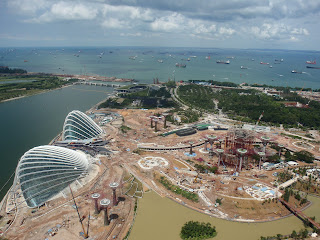Gardens by the Bay Singapore Construction Work at July 2011. Photo: Wikipedia
As published today (January 1, 2013) in the Channelnewsasia.com of the MediaCorp Pte Ltd Company, Sri Lanka and the Philippines have been identified as new source countries for construction workers according to the Building and Construction Authority in Singapore .
it has been reported recently that China one of the biggest source of Construction workers in Singapore said that recruiting workers for Singapore has become increasingly difficult over the past five years as the wage gap between the two countries has narrowed.
And the fallout from the recent illegal strike by SMRT bus drivers from China is now deterring some from applying to work in Singapore.
Unfair and unjust - these are just some of the comments posted by Chinese internet users on Weibo after a former Chinese SMRT bus driver received a six-week jail sentence for taking part in an illegal strike in Singapore.
The Building and Construction Authority (BCA) told MediaCorp that two test centers will be set up in Sri Lanka.
Approval is also being sought from the Philippine authorities to establish test centers but it would takes a little time as the Philippine government is also restricting for sending OFW abroadto make sure that the workers safety is given priority. Minimum compensation and other benefits are also part of the requirements.
The Philippines has a bit expensive construction workers compare to the other BCA sources because most Filipinos who are interested to work abroad are at least high school graduate, a level of educational attainment which are already qualified as office workers in other ASEAN countries.
The BCA hopes to bring in skilled construction workers from Sri Lanka and Philippines to boost supply and diversify the source for foreign labor.
The main sources of foreign construction workers in Singapore are from China, India and Bangladesh. The authorities want to be less reliant on these countries as their recruits from the said countries are continue declining.
Mr. Neo Choon Keong, BCA's group director of manpower and strategies policy, said: "What we are seeing now is that the major sources like China, India, because of the fast development the number of workers is actually coming down over time, because there are plenty of jobs there.
"So for resilience perspective, we are working with the industry to open up new sources to locate skilled workers, notwithstanding our efforts to reduce the numbers of foreign workers overall through the adoption of technology as well as better building designs."
Demand for foreign construction workers in Singapore is expected to remain strong in the years ahead, as the government is ramping up infrastructure development such as expanding the rail network and building more flats and health-care facilities.
In a recent report, the National Population and Talent Division expects the demand for foreign construction workers on low-skilled work permit holders to increase from some 250,000 in 2011 to about 280,000 in the next two to three years.
The BCA said most workers in Sri Lanka and Philippines speak English and this will help improve communication on the construction site.
Construction workers who want to work in Singapore have to go through a rigorous training regime in their country.
They have to stay in the training centre and undergo a full-time program lasting between 3 and 6 months.
Only seven out of 10 of these workers would eventually pass the test.
After the training, potential workers have to go through a five-hour practical test on essential craft skills as well as a one-hour theory test on trade knowledge.
Currently, there are 26 overseas testing centers in China, India, Bangladesh, Thailand and Myanmar.
Potential workers can choose to be tested in 29 construction skills.
Construction company Progressive Builders will be operating one of the two new test centers in Sri Lanka.
It's managing director Ng Yek Meng said for a start, workers will be tested in 12 construction skills such as steel reinforcement work, tiling and plastering.
He said these tests are to ensure workers coming to Singapore are of a certain standard and quality, and could in turn help raise productivity.
Mr. Ng said: "Some of the workers, especially if they come from agriculture (background), don't even know how to operate certain equipment. The test is quite stringent not only in Sri Lanka but for all source countries. Whoever can pass the test, I think they are of a certain quality. So this is how we can sieve the good ones and the bad ones."
The test centers in Sri Lanka are expected to be operational in six months' time.
Besides bringing in better quality construction foreign workers, the BCA also has a comprehensive training framework to continuously upgrade them.
Some 12,000 foreign construction foreign workers have upgraded their skills through these various programs. read more in Channelnewsasia.com













0 comments:
Post a Comment
Thank you for leaving comment!. We encourage responsible and peaceful comments that add dimension our discussion. No Profanity , No bashing or hate speech, please. You can express your opinion without slamming others or making derogatory remarks.